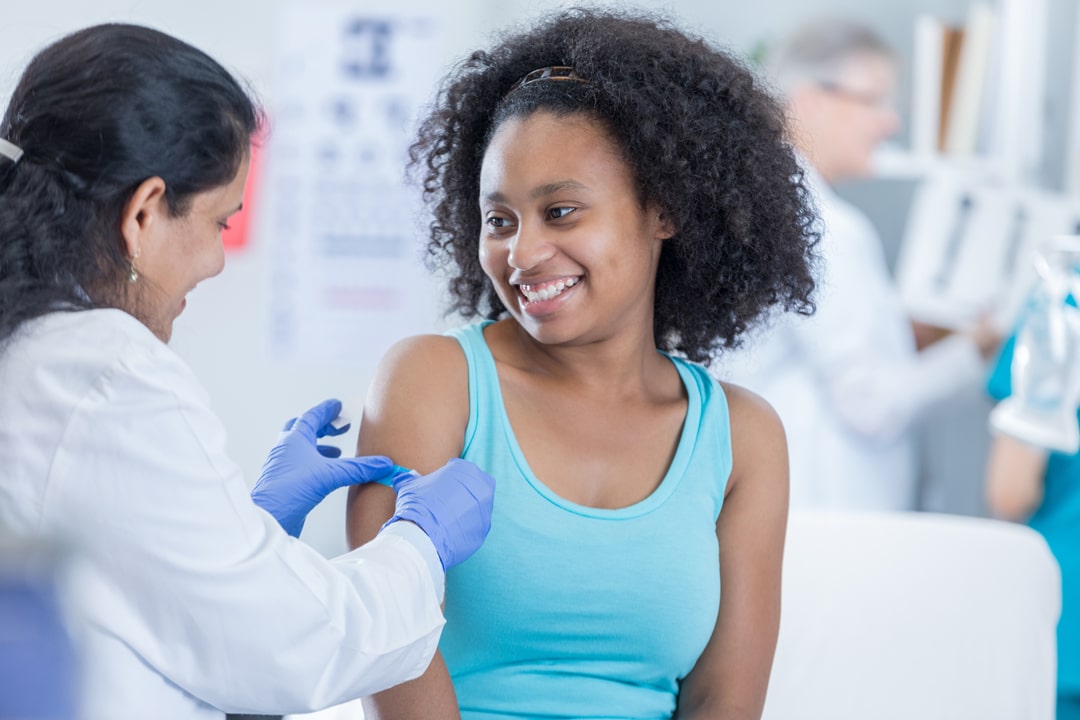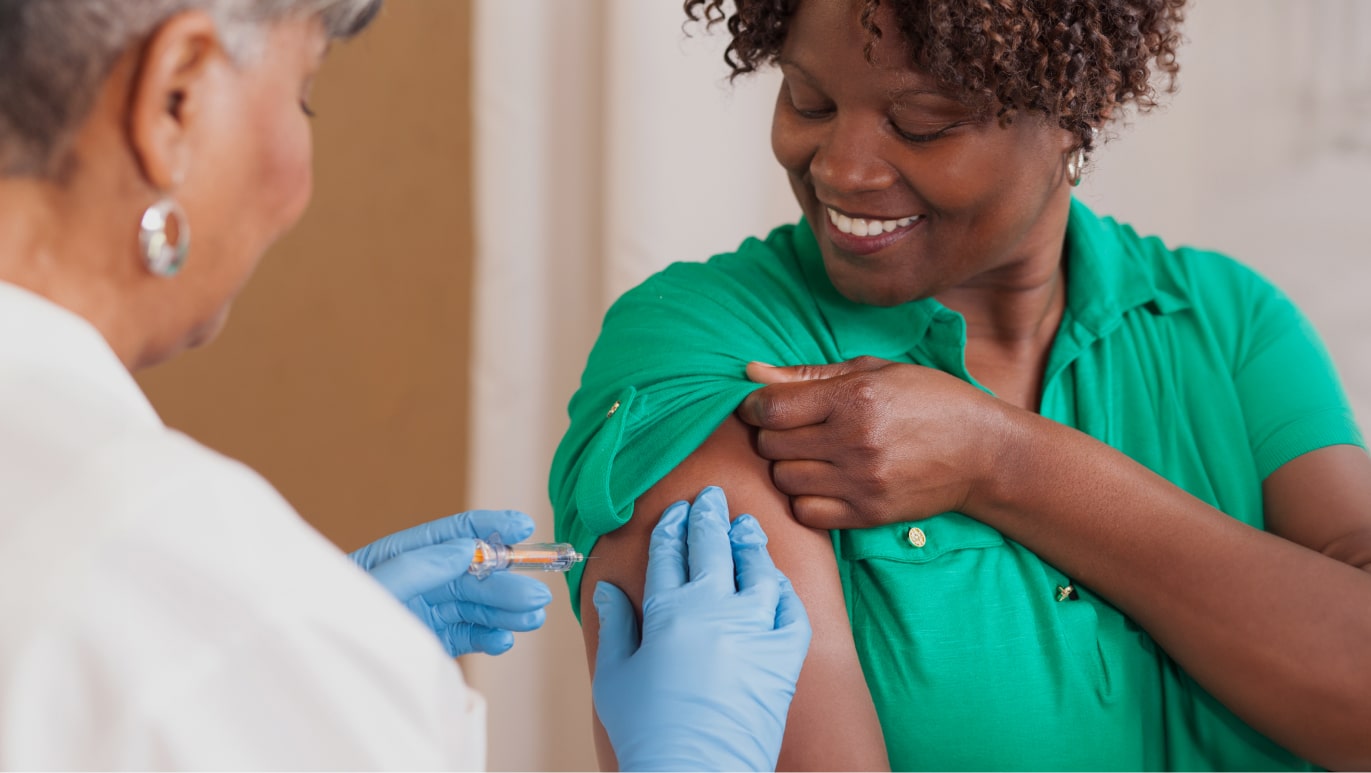The Ongoing Importance of COVID-19 Boosters
As another winter season is upon us following the COVID-19 pandemic, staying up to date with COVID-19 vaccinations, including booster shots, remains crucial. While the initial vaccine doses provide strong protection, immunity can wane over time, and new variants of the virus continue to emerge. Booster shots are essential in maintaining a high level of immunity, particularly during the colder months when people spend more time indoors and the risk of transmission increases.
This blog discusses the latest updates on COVID-19 boosters, who should get them, and how they can help protect you and your loved ones during the holiday season. Additionally, for specific groups, such as those who are moderately or severely immunocompromised, consulting healthcare providers about the possibility and timing of additional doses is important to ensure continued protection.

Understanding COVID-19 Vaccines
Types of COVID-19 Vaccines
COVID-19 vaccines are designed to protect against severe disease and severe illness caused by the SARS-CoV-2 virus. There are several types of COVID-19 vaccines, each utilizing different technologies to stimulate the immune system.
- mRNA Vaccines: The Pfizer-BioNTech vaccine and the Moderna vaccine are examples of mRNA vaccines. These vaccines use a piece of genetic material called messenger RNA (mRNA) to instruct cells in the body to produce a protein that triggers an immune response. This response helps the body recognize and fight the virus if exposed in the future.
- Protein-Based Vaccines: The Novavax vaccine is a protein-based vaccine. It uses a piece of the SARS-CoV-2 virus, specifically the spike protein, to stimulate an immune response. This type of vaccine provides a different approach to training the immune system to recognize and combat the virus.
- Viral Vector Vaccines: The Johnson & Johnson vaccine is an example of a viral vector vaccine. It uses a different virus (not the coronavirus) to deliver genetic material to cells. These cells then produce a protein that triggers an immune response, preparing the body to fight the actual virus.
Each type of vaccine has been shown to be effective in preventing severe disease and severe illness, contributing to the overall effort to control the spread of COVID-19.
What’s New with COVID-19 Vaccines?
COVID-19 vaccines have been instrumental in reducing the severity and spread of the virus. However, as the virus evolves, so too must our approach to vaccination. This section provides an overview of the latest updates and recommendations regarding COVID-19 boosters.
Updated Vaccine Formulations: Novavax Vaccine
Bivalent Boosters: The latest COVID-19 booster shots are bivalent vaccines, which means they target two strains of the virus: the original strain and the newer variants, including Omicron subvariants. These bivalent boosters are designed to address the latest circulating strains and variants, providing broader protection against the evolving virus.
FDA and CDC Recommendations: The U.S. Food and Drug Administration (FDA) and the Centers for Disease Control and Prevention (CDC) have recommended bivalent boosters for specific populations, with guidance evolving as new data becomes available. These recommendations are based on the latest research and real-world effectiveness of the vaccines.
Eligibility for COVID-19 Boosters
Who Should Get a Booster?: The CDC recommends that everyone aged 6 months and older receive a COVID-19 booster shot. The timing and number of booster doses depend on age, health status, and the type of vaccine previously received. Immunocompromised individuals, older adults, and those with underlying health conditions are especially encouraged to stay up-to-date with their boosters. Individuals who are moderately or severely immunocompromised should follow specific vaccination schedules to ensure they receive appropriate vaccine doses.
Timing of the Booster: For those who have completed their primary COVID-19 vaccination series, the CDC recommends getting a booster shot at least two months after the last dose. If you have already received a previous booster, check the latest guidance to see if an additional booster is recommended based on your age and health status.
Vaccine Effectiveness Against Emerging Variants
Omicron and Its Subvariants: The Omicron variant, which emerged in late 2021, has shown a higher level of transmissibility compared to previous strains. The bivalent boosters are specifically formulated to target Omicron subvariants, offering enhanced protection against these more contagious forms of the virus.
Ongoing Research and Adaptation: Vaccine manufacturers and public health agencies are continually monitoring the effectiveness of the boosters against emerging variants. As new variants arise, covid vaccines may be further updated to ensure they provide the best possible protection.
Vaccine Safety and Side Effects
COVID-19 vaccines have undergone rigorous testing in clinical trials and have been proven to be safe and effective in preventing severe disease and severe illness. However, like all vaccines, COVID-19 vaccines can cause side effects. Common side effects include pain, redness, and swelling at the injection site, as well as fatigue, headache, and muscle pain. These side effects are generally mild and short-lived.
In rare cases, COVID-19 vaccines can cause more serious side effects, such as anaphylaxis, a severe allergic reaction that requires immediate medical attention. It is essential to discuss any concerns or questions about vaccine safety and side effects with a healthcare provider. They can provide personalized advice and address any specific health considerations you may have.
Who Should Get a COVID-19 Booster?
COVID-19 boosters are recommended for most people, but certain groups are particularly encouraged to get boosted due to their higher risk of severe illness or exposure to the virus.
Older Adults
Increased Risk with Age: Older adults, especially those aged 65 and over, are at a higher risk of severe illness, hospitalization, and death from COVID-19. The immune system naturally weakens with age, making it less effective at responding to infections, including COVID-19. Boosters help to maintain a higher level of immunity in this vulnerable population.
Recommendations for Seniors: Older adults should ensure they receive all recommended doses, including the latest bivalent booster, to reduce their risk during the winter months, when respiratory illnesses are more common.
Immunocompromised Individuals
Heightened Vulnerability: People with weakened immune systems, whether due to underlying health conditions or treatments like chemotherapy, are at an increased risk of severe COVID-19 and other infectious diseases. Their immune response to the initial vaccine series may not be as strong, making boosters even more critical.
Tailored Booster Schedule: Immunocompromised individuals may require additional booster doses beyond what is recommended for the general population. It’s important for these individuals to follow the specific guidance provided by their healthcare provider, often in consultation with infectious diseases specialists.
Healthcare Workers and Essential Workers
Increased Exposure Risk: Healthcare workers and those in essential services often have a higher risk of exposure to COVID-19 due to their work environment. Boosters help protect these individuals, allowing them to continue their critical work safely.
Occupational Guidance: Many workplaces, particularly in healthcare, may have specific vaccination and booster requirements to protect both employees and the people they serve. Staying up-to-date with boosters is a key component of occupational safety in these fields.
Vaccine Effectiveness Against Variants
COVID-19 continues to evolve, and new variants can potentially reduce the effectiveness of vaccines. However, boosters play a crucial role in maintaining protection against these variants, especially during the holiday season when transmission risk is higher.
How Boosters Enhance Immune Response
- Strengthening Immunity: Booster shots, including those utilizing mRNA vaccine technology, help to “remind” the immune system of the virus, enhancing and prolonging the immune response. This is particularly important as immunity from the initial vaccine series may wane over time.
- Broader Coverage: The bivalent boosters provide broader protection by targeting both the original virus and newer variants, making them more effective at preventing severe illness, hospitalization, and death caused by variant strains.
Real-World Data on Booster Effectiveness Against Severe Disease
- Reduction in Hospitalizations: Studies have shown that individuals who receive a COVID-19 booster are significantly less likely to be hospitalized with severe illness compared to those who have not received a booster. This is especially true for older adults and those with underlying health conditions.
- Ongoing Monitoring: Public health agencies continue to monitor the effectiveness of the boosters against emerging variants, adjusting recommendations as needed to ensure the population remains well-protected.
Clinical Trials and Vaccine Development
COVID-19 vaccines have undergone extensive testing in clinical trials to ensure their safety and efficacy. Clinical trials involve administering the vaccine to a large group of people to assess its ability to prevent severe disease and severe illness. The results of these trials have shown that COVID-19 vaccines are highly effective in preventing severe disease and severe illness, leading to their approval for emergency use by regulatory agencies around the world.
The development of COVID-19 vaccines has been a collaborative effort between governments, pharmaceutical companies, and healthcare organizations. This collaboration has involved the use of advanced technologies, such as mRNA and viral vector platforms, to rapidly develop and test vaccines. The success of these efforts has been a significant milestone in the fight against COVID-19, providing a critical tool in controlling the spread of the virus.
Combining COVID-19 and Flu Vaccines
As we navigate flu season alongside COVID-19, many people wonder whether it is safe and effective to receive both the COVID-19 and flu vaccines. The good news is that it is not only safe, but also recommended to get both vaccines.
Dual Protection
Flu and COVID-19 Vaccines Together: It is safe to receive both the flu and COVID-19 vaccines during the same visit. Doing so provides dual protection against two major respiratory illnesses that can circulate simultaneously during the winter months.
Convenience and Accessibility: Many pharmacies and healthcare providers offer both vaccines at the same appointment, making it easy to get fully vaccinated with minimal disruption to your schedule.
Addressing Concerns
Side Effects: Some people may experience mild side effects, such as soreness at the injection site or a low-grade fever, after receiving either vaccine. For those receiving the second dose of COVID-19 vaccines like Moderna and Pfizer-BioNTech, there may be an increased risk of myocarditis and pericarditis, particularly in individuals over 65 and those who are moderately or severely immunocompromised. These side effects are generally short-lived and much less severe than the potential complications of flu or COVID-19.
Optimal Timing: The CDC recommends getting vaccinated against both flu and COVID-19 as soon as the vaccines are available to ensure maximum protection throughout the holiday season and winter months.
Getting Vaccinated
Where to Get a COVID-19 Vaccine
COVID-19 vaccines are widely available at various locations, including healthcare provider offices, pharmacies, and community health centers. To find a location near you that offers COVID-19 vaccines, you can visit the website of your local health department or use a vaccine finder tool. It is essential to make an appointment in advance, as availability may be limited.
Additionally, many health insurance plans cover the cost of COVID-19 vaccines, so it is essential to check with your insurance provider to confirm coverage. Ensuring you are vaccinated not only protects you but also helps protect your community by reducing the spread of the virus.
Protecting Your Health This Holiday Season
As we approach the winter season and the holidays, staying up-to-date with COVID-19 vaccinations, including boosters, is crucial for protecting yourself and those around you. Getting the COVID vaccine is an essential part of staying healthy, as it helps prevent severe disease, hospitalization, and death from COVID-19. The latest updates on COVID-19 boosters, including the introduction of bivalent vaccines, provide enhanced protection against the evolving virus, particularly against variants like Omicron. Whether you are an older adult, immunocompromised, or simply want to ensure you stay healthy during the holidays, getting your booster shot is a key step in safeguarding your health.
In addition to COVID-19 boosters, don’t forget to get your flu vaccine to protect against seasonal influenza. By combining these vaccines, you can enjoy the holiday season with greater peace of mind, knowing you’ve taken important steps to protect your health and the health of your community.

